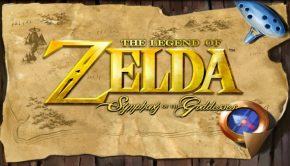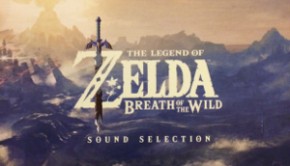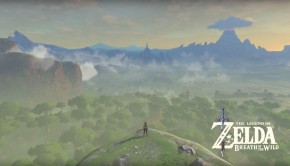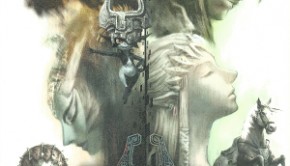Paul Weinstein (aka Chipocrite) Interview: Chiptune Concerts with Game Boys
Paul Weinstein, better known as Chipocrite, has engaged listeners at various events with his original music made using Game Boys. He is dedicated to bridging the comforting video game tones of his youth with the complex but catchy songs that influenced him in years later.
In this interview, Paul Weinstein recollects his experiences making the transition from the bassist of MJ Project, to an independent chiptune musician. He also discusses his diverse musical influences, perspectives on technology, and career highlights such as The Legend of Zelda trailer.
Interview Credits
Interview Subject: Paul Weinstein (aka Chipocrite)
Interviewer: Matt Diener
Editor: Chris Greening
Coordination: Matt Diener
Interview Content
Matt: Many thanks for taking the time to speak with us today, Paul. Can you tell us a bit about your musical background? What drew you to performance and composing in the first place?
Paul Weinstein: Sure, thanks for having me! I’ve been a huge music fan as far back as I can remember. Mostly it started with listening to my dad’s records at a young age and really getting into the rock classics — to this day I’m still massively obsessed with and fascinated by The Beatles, Pink Floyd, bands like that. When I got a little older, I started to explore some more modern stuff on my own, and eventually I started getting into some really complicated and exploratory music. That was also probably related to when I started playing guitar in about 6th grade or so — I started wanting to play more fun and complicated stuff beyond basic Led Zep riffs. (Don’t get me wrong, I enjoy playing that stuff as well.)
Believe it or not I’m actually a huge Phish fan, which actually led me to a lot of crazy, proggy music like Rush, Yes and Frank Zappa, and also to a ton of jazz and 70s fusion. I always had a huge amount of respect for the songwriting those guys were capable of, and it certainly influenced me to want to write and perform my own music with a certain kind of complexity and disciplined structure, I guess you could say. Also, in high school, I started to really get into some really interesting electronic music, mostly drum and bass and Squarepusher-type IDM. It’s a lot of seemingly random and maybe disconnected influences but somehow it all makes sense in my head.
Anyway, I started on bass in 9th grade, mostly because no one else in my group of musician friends would give up guitar, but it ended up being another one of my smartest decisions — bass is definitely my favorite stringed instrument. I’ve often said, I play regular guitar for fun, but I play bass to get better. If you think about it, some of the thinking behind playing bass is sort of similar to the chip music mentality. You have to accomplish more with less (less strings, in the case of the bass), you have to find unique ways to keep it interesting, and you have to try a little harder to get people to appreciate what you’re doing.

Matt: I’d like to continue by asking how you transitioned your musical career from a rock bassist with MJ project to a chiptune composer and what lead you to the decision.
Paul Weinstein: So basically, the timing of MJ project breaking up and me starting my own solo chip music project was a big coincidence, but in hindsight it really worked out incredibly well. The chip/8-bit sound is something I’ve wanted to emulate as a musician for years. One of the first chip acts I ever heard was a Japanese group called YMCK, who make jazzy, catchy, poppy music with an NES, I think, and as a huge fan of all three of those adjectives, as well as the old-school video games I grew up with, I was blown away by how perfect that concept was. I loved it, and I really wanted to figure out how they were doing it, but I didn’t have much time or resources for researching and learning. At that point in my life, most of the musical stuff I needed to focus on when I had time for it was related to the band, whether it was learning a new song, prepping for our next show… you get the idea.
Fortunately, in late 2008, I heard that Philly was starting to develop its own chip music scene, which was centered around a monthly show some of these guys had started called 8static. I missed the first few 8statics, but literally forced myself to attend the January 2009 show. This actually ended up being one of the best decisions I ever made, because there was a pre-show seminar that night featuring local chip legend Animal Style giving a workshop on how to get started using Little Sound DJ, the software I now use to make music on Game Boys. I went home that night, bought a license for LSDJ and started using it right away. I became pretty obsessed with it pretty quickly, but still didn’t have as much time as I really needed to really get as good with it as I was hoping to.
Later in that year, the lives of my bandmates started to go in pretty drastically different directions, and we decided to split up. It was a little rough at first — we had been together for more than 10 years — but I soon realized that this would afford me the time to learn LSDJ. So all the time I used to spend practicing with the band, I was now spending with Game Boys, and I felt like it was a natural evolution. Plus, even though I have written several completely new compositions just for Game Boy, I was able to keep some of my favorite songs I used to play with my band alive by re-arranging them for Game Boy.
Matt: Is there anything you miss from the rock and roll scene?
Paul Weinstein: I guess there are a few small things, though I have to admit I love being a solo artist. Even though my band’s breakup was totally amicable, making decisions and getting things done all on my own is a lot easier! The music I make now is obviously very different than playing with three other people, so to be honest, I sometimes miss the organic, open and unpredictable creation process of playing entirely live instruments. I also sometimes miss having a huge repertoire — my band played together for so long that we had a ton of originals and covers we could choose to play at any given moment. When I’m developing setlists at shows, I’m pretty much limited to what I have worked out and completed in advance. But I’m constantly trying to increase that repertoire so it’s getting bigger and better every day. And I’m having a ton of fun on my own so I don’t get too nostalgic too often!
Matt: New York City and Philadelphia play host to several underground chip music concerts like 8static, I/O, Pulsewave and Blipfestival (to name a few), many of which you’ve performed at. Can you discuss your experiences at these events? Given the low (often free) price of admission- what is the overarching goal of them?
Paul Weinstein: Live chip shows are incredibly exciting, and they’re also really important to me, in a few ways. First, as I said before, attending shows in person really allowed me to see the technology first-hand and get started using it myself. I can honestly say I wouldn’t be anywhere in chip music without 8static. Chip shows are also incredibly important because I think it’s very hard to understand how music generated by a Game Boy can be taken seriously as a respectable art form until you hear it blasting out of a huge PA with slick, amazing live visuals behind it. I also think the fact that most of these shows are monthly or annual really gives people something to look forward to on a regular basis, and it’s a great way to build a solid, reliable and dedicated community. I have a blast at pretty much every live chip show I go to, no matter who’s playing.
As far as the overarching goal, I think it’s really to just continue establishing this kind of music, and these kinds of shows, as a viable art form that people really enjoy seeing live. I’ve seen 8static grow a lot over the past two years, and I think it’s not just because we’ve been bringing in a ton of amazing music. It’s also that people start to look forward to it every month as something they can rely on for a great time with great people. And just as I started playing chip music by attending shows, another goal is to get more people involved themselves. It really does seem like every artist brings something different to the table, and I personally love discovering someone new and seeing his or her unique take on it. Basically, having as many live chip shows as possible is the best way to build a larger audience and inspire more musicians. We’re trying to make it a force to be reckoned with!
Matt: I imagine that it is not easy to replicate the chiptune sound as faithfully as you do at such shows. What hardware and software do you compose on?
Paul Weinstein: The hardware I use is entirely Nintendo Game Boys (when I’m not playing bass along with it, if course) — specifically, the original “Game Boy Classic” or “Play It Loud!” series, aka the DMG-01. These are the oldest, biggest and most awesomest consoles in the Game Boy family. I do have a few other models (Game Boy Colors, Advance SP, etc.) but the original DMGs seem to get the best sound, best battery life, are most reliable, etc. They just feel like really solid instruments when I’m composing or performing with them. Most of the ones I use have been slightly modified, but the mods are really just for live performance (the screens are backlight, so I can see them in low lighting, and there is a really slight sound modification that reduces hum and boosts the bass a little). The Game Boys are not hacked in terms of processor or anything; they would still play Tetris exactly the same as they did in 1989. And vice versa — you could play a cartridge containing one of my songs on any Game Boy that could read that cartridge.
The software I use is a music sequencer/tracking program called Little Sound DJ. It’s basically a tracker interface that gives musicians full control over the Game Boy’s built-in sound capabilities, as opposed to requiring the user to program a soundtrack using some ancient language that is less musical and more technical. As you can imagine, these old games didn’t have a recorded soundtrack built in — the space limitations were too strict. Instead, they had code that would tell the different parts of the console’s sound chip what sounds to synthesize and when. LSDJ gives you a really well-built and intelligent user interface with pretty instant feedback, which makes it a great tool for songwriting instead of just a really technical tool.
Matt: Have you been limited by the hardware and software available to you?
Paul Weinstein: A lot of chip musicians will tell you that the limitations are actually what makes this style of music so fun, and I completely agree with them. Aside from their limited sonic capabilities — that is to say, these sound chips really can only generate a few specific soundwave shapes, giving you a kind of specific sound palette right off the bat — they can actually only play a certain limited number of sounds together at any time. The Game Boy, for example, only has four sound channels, so realistically you can only have four sounds playing at the same time at any given moment.
The key to really good chip music is kind of tricking the listener into perceiving that there’s a lot more going on. There are tons of ways to do it, without getting too specific, but really, figuring out the best ways to fit all the sounds your song needs into that limited space is a ton of fun. I’ve started describing it recently as “songsolving” instead of just songwriting. You have to figure out what fits best where and when to get as close to the sound in your head as possible. Of course, I could just use other hardware, but there’s something incredibly rewarding about getting the sound you want out of this limited hardware. And I’m so used to the sound at this point that I truly do think of the Game Boy as a specific instrument, not just a video game system, and it’s an instrument I love to play.
Matt: As a child of the 1980s, it is easy to understand the draw to chiptune music. What are some of your biggest influences (gamers or composers) from that era and from the modern chip music scene?
Paul Weinstein: All I really had back then was an NES and a Game Boy, so the sound capabilities of those two systems were really ingrained in my head even before I understood how they worked. I was always a huge fan of — and today, heavily influenced by — video game soundtracks in which you could really hear that the composers tried really hard to do something interesting. That is to say, you could always tell the games where they didn’t just throw together a few 40-second songs that just kind of worked in the background — they actually put a lot of time and effort into creating a cohesive, intelligent soundtrack, with recurring themes and motifs, awesome harmony and creative or clever songwriting. It’s kind of funny to think about NES music like that but I always noticed and was impressed by a smart soundtrack.
Some of my favorite examples are Maniac Mansion, in which every character in the game had a theme song that really matched his or her personality, and Super Dodge Ball, in which you traveled the world playing disproportionately violent dodge ball, but with really clever songs in the style of whatever country you happened to be in at that time. I didn’t know composers by name back then, but I certainly appreciated what they were doing. In recent months I’ve gone back and discovered some of the great NES songwriters by name, and I have to say that I am most blown away by the work of a guy named Tim Follin, who did work on some seriously ridiculously awesome soundtracks such as The Silver Surfer, among tons of others.

As for contemporary chip influences, I’d be nowhere without Animal Style, Glomag, Anamanaguchi, Kris Keyser, Note!.. Too many to mention. I feel like I have to mention specifically that most of what I do always comes back to Bit Shifter. Sometimes I feel like my stuff is so influenced by him that I’m worried someone is going to call me out! All I can say is, there are so many brilliant chip musicians out there doing incredible stuff, it’s difficult to NOT want to try it out yourself. Hopefully, in the end, your own stuff sounds more like your own take on an idea instead of a straight-up rip-off.
Matt: Many fans of video game music have noticed a trend toward retro scores in recent titles (both mainstream and independent). Would you agree that game soundtracks are tracking back to their formative roots? If so, what do you think the reason for this is?
Paul Weinstein: I think the retro trend goes way beyond just the scores — I’d say the retro aesthetic is driving entire games and franchises right now. The way I see it, there are a few reasons for this. First of all, on the programming side, many of us who grew up playing older games are finally at a point where we are smart and capable enough that we can figure out how to control that technology and make our own dream games (or soundtracks) that we would have loved to have as kids. Fortunately, I think a huge portion of the video game audience is in the same position — older, but still fond of those retro games they grew up with, and, now with disposable income, ready to spend some of their own money on great new game experiences (instead of maybe having to beg their parents like the probably did when they were little).
I think there’s a misconception with some technology that just because newer systems are coming out, they completely replace the old systems and make them totally obsolete. But if a game is timelessly fun, as many NES games are, for example, what difference does it make that it doesn’t have as good graphics or music as an Xbox game?
In any case, to get back to the place of soundtracks in all of this, that original 8-bit sound is a huge part of recreating that retro aesthetic. I’ve played some games recently that you might not consciously think of as “old school” until the retro soundtrack sort of makes you realize it. People really enjoy a modern take on something they cherished when they were kids, so I can see how music that reminds them of that is an increasingly important part of creating a throwback-style game.
Matt: You recently enjoyed a wave of exposure for your cover of “Bizarre Love Triangle” that was featured in The Legend of Zelda (1987) spoof trailer. Can you please discuss how you became involved in the project? Were you allowed to suggest the song that you covered?
Paul Weinstein: My involvement in that began about a year ago. I saw a posting on Twitter or Facebook in which local radio station 93.3 WMMR was looking for local bands/musicians to provide music they could feature as the soundtrack to short videos they post online every so often. I figured it was a long shot, but I sent them my stuff, explaining what I do and suggesting they might be able to use it for “something nerdy.” As it turns out, the guy who was soliciting the music, local filmmaker Nick Murphy, is a huge fan of retro games and was already quite hip to the chip music scene. We started a very positive email back-and-forth, and soon he was using clips of my existing songs for various clips.
But aside from his work for WMMR, Nick also does some really amazing and hilarious video game/movie parody videos, and I was excited when he pitched the Zelda concept to me. He came up with the whole idea, including the song (which was basically a triforce joke, as far as I can tell), but I was happy to do it because 1) it’s hilarious and 2) it’s a good song and I had a ton of fun covering it. I figured it would get me a decent amount of exposure, so I was pleasantly surprised and excited when it actually got me like, a TON of exposure! I play that song at most live shows now and always get an excited response from the audience. So I’m infinitely happy I started working with those guys, and I’m looking forward to future projects.
Matt: Do you see yourself releasing an album of chiptune covers of 80’s music or is “Bizarre Love Triangle” more of a standalone project?
Paul Weinstein: Hahah, “Bizarre Love Triangle” was a standalone project, sort of. I’m more than happy to work on covers — I have a great time reinterpreting music, especially trying to figure out the best way to fit the original concept into the Game Boy’s limitations (remember what I said before about songsolving). And as a matter of fact, I’ve worked on a pretty sizeable amount of other covers over the past eight months or so. I did a set in costume as Prince for the annual Halloween Pulsewave show, where chip artists usually pick someone to cover just for that night, and reinterpreted five of his songs on Game Boy. More recently, I was booked to open for Lebowski Fest in Philadelphia, sort of a touring convention for “Big Lebowski” fans, and was asked to cover songs from the soundtrack. So I was working on Creedence Clearwater Revival, Bob Dylan, etc., tunes for that show. I might release the Lebowski stuff as kind of a goofy EP online sometime soon, so stay tuned!
Matt: If you were given an opportunity to score any upcoming game or hypothetical future installment of an established franchise, what game would you choose and why? Are there any composers you would like to work with?
Paul Weinstein: Well, if it were an upcoming or current game, it would probably require a retro-style soundtrack, I suppose. It would be a blast to do some work on a Super Meat Boy sequel or something like that. Also, the 8-bit style Mega Man games that have come out for Virtual Console and such… It would be an honor to work on that soundtrack. And of course, if anyone wants to revive Super Dodge Ball, I’d be happy to come up with some more country-specific songs for the game’s world tour! I promise I will be culturally sensitive.
Matt: Many thanks for taking the time to speak with us today, Paul Weinstein. Is there anything you would like to say else you would like to say to your fans, or fans of chip music in general?
Paul Weinstein: I just want to thank everyone who has supported me so far. The positive feedback from people all over the country and all over the world is what’s keeping me going. I love knowing that people I’ll probably never even meet are downloading my music and enjoying it, and it really keeps me motivated to create more. I also want to give a shout-out to all of my chip music friends for helping me learn the ins and outs of this stuff, and for giving me a shot in the first place. And finally, I just want to encourage anyone who hasn’t yet been to a live chip show to check it out and see what it’s like in person — I think you will be pleasantly surprised. Thanks!
Posted on July 15, 2011 by Matt Diener. Last modified on March 2, 2014.














